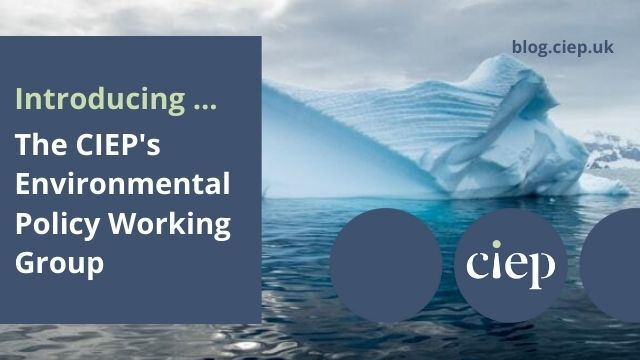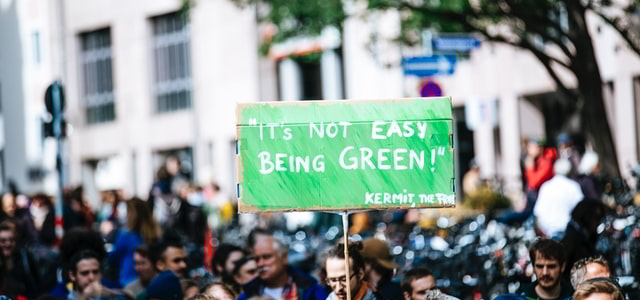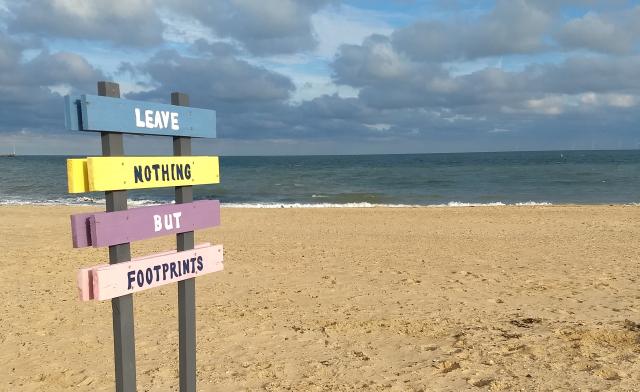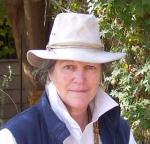This feature comes from the band of CIEP members who volunteer as forum moderators. You will only be able to access links to the posts if you’re a forum user and logged in. Find out how to register.
In this article, one CIEP forum member looks at what our forums have taught us about being environmentally friendly at work and at home, and interviews Caroline Petherick, who posts on the forums regularly about sustainability, to glean her recommendations for reducing our carbon footprint.
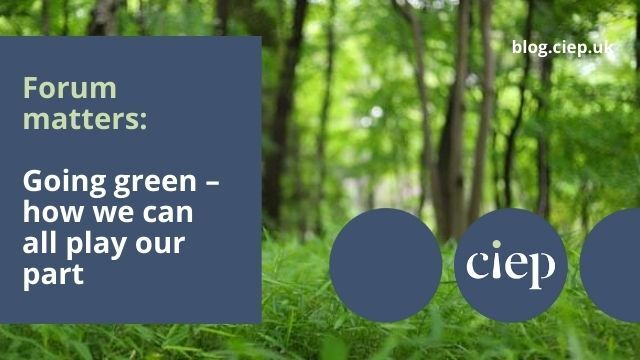 The environment is a hot topic at the moment with the recent publication of the Intergovernmental Panel on Climate Change (IPCC) Working Group’s report, which UN Secretary-General António Guterres called ‘code red for humanity’. With this sobering fact in mind, many people are trying to reduce their carbon footprint. There are many ways to do this, and some have been discussed on the forums.
The environment is a hot topic at the moment with the recent publication of the Intergovernmental Panel on Climate Change (IPCC) Working Group’s report, which UN Secretary-General António Guterres called ‘code red for humanity’. With this sobering fact in mind, many people are trying to reduce their carbon footprint. There are many ways to do this, and some have been discussed on the forums.
At work
Want to use the most planet-friendly printer? Want to find out some options for recycling your old computer or recycling printer cartridges? What do you do with printed manuscripts* after you’ve edited them? Last but not least, here’s some information on the correct terminology to use when editing environment-related texts.
*You’ll need to be registered for the fiction forum to see this post.
At home
Many of us feel powerless in the face of the climate crisis. But, from adding solar panels to our homes to protesting against plastic pollution, there’s a lot we can do as individuals. Why not take part in Earth Hour Day, which is every 26 March? Would you like to find out how to live a zero-waste lifestyle? Find out more here. Finally, read how Wall Street is taking action on the climate crisis.
Helping nature
Are you keen to help butterflies and protest again the use of harmful neonicotinoids for growing sugar beet? Or do you want to find out more about keeping bees, which are essential for pollination on Earth?
 Since many of these posts were started or contributed to by Caroline Petherick, we asked her for her views.
Since many of these posts were started or contributed to by Caroline Petherick, we asked her for her views.
Caroline, over the years you have posted a lot on the forums about sustainability, bringing our attention to important topics such as the recent IPCC report, plastic pollution and Earth Hour Day, and you wrote a CIEP blog about the climate crisis in 2019. The environment and the future of our planet are clearly important to you. What do you think is the most pressing issue facing us today?
CP: The consequences of the current Western-style political system, based as it is on short-termism. This results in the lack of political will to introduce regulations relating to a swift enough reduction in (a) the corporate addiction to fossil fuels, and (b) the appallingly rapacious production methods of foods and goods, to get us anywhere near the Paris Agreement. We need not only to introduce those regulations but also to enforce them.
It will, I reckon, only be when enough people put enough pressure on their governments to implement the measures, and to police them effectively, that politicians’ fear of losing their jobs will subside enough to allow them to take appropriate, effective action.
Most people can’t afford the capital costs required to become fully sustainable – such as electric cars, heat pumps, etc. We need bulletproof funding to kick-start these life-saving systems.
The trouble is that when/if politicians do implement and enforce appropriate regulations (as opposed to emitting their current greenwash), it looks as though it will be far too late – unless some sort of hitherto unforeseen climate step change happens.
What measures do you take to live as sustainably as possible?
CP: I believe it’s important not to get diverted into taking individual responsibility to a degree that lets the politicians and corporations off the hook. We need to put pressure on politicians to act. Having said that, there are some things you might like to consider doing as well:
- recycle everything you can, and reuse items where possible
- become vegetarian, or at least eat less meat
- eat locally produced food
- use a local organic veg-box scheme
- have your supermarket shopping delivered
- use your car only when absolutely necessary
- turn off lights in empty rooms, and check that nothing’s been left on stand-by
- buy second-hand clothes. Avoid fast fashion
- line-dry your washing when possible. Only use the tumble drier when you have to
- use Ecover and similar detergents, soaps, hand washes and toiletries
- let your grass grow! Have you heard of No-mow May? Why not try that? See what kind of insects and other wildlife you can attract
- bank with an ethical bank
- only switch on your central heating when you have to. Until then, layer up!
If you could give CIEP members one piece of advice for being more environmentally friendly, what would it be?
CP: Get on yer bike – your lifestyle and fitness permitting – for any journey under 3 miles each way. It’s a triple whammy: you’ll get much fitter, your body will stay warmer in winter (so you can turn down the heating), and you’ll emit far fewer pollutants.
Find out more
To find out more about the climate crisis, why not check out or support organisations such as Greenpeace, Friends of the Earth, Amnesty International, Toilet Twinning, TreeSisters, the National Biodiversity Network, the RSPB, the Woodland Trust, the Marine Biological Association, Plantlife, WaterAid, Rainforest Rescue and Save the Whales?
Following organisations such as the National Oceanography Centre, the Marine Conservation Society, the Met Office and the National Oceanic and Atmospheric Administration will also help you stay informed about the climate.
 About the CIEP
About the CIEP
The Chartered Institute of Editing and Proofreading (CIEP) is a non-profit body promoting excellence in English language editing. We set and demonstrate editorial standards, and we are a community, training hub and support network for editorial professionals – the people who work to make text accurate, clear and fit for purpose.
Find out more about:
Photo credits: garden by Mathis Jrdl; nature computer by Niclas Illg, both on Unsplash.
Posted by Abi Saffrey, CIEP blog coordinator.
The views expressed here do not necessarily reflect those of the CIEP.

